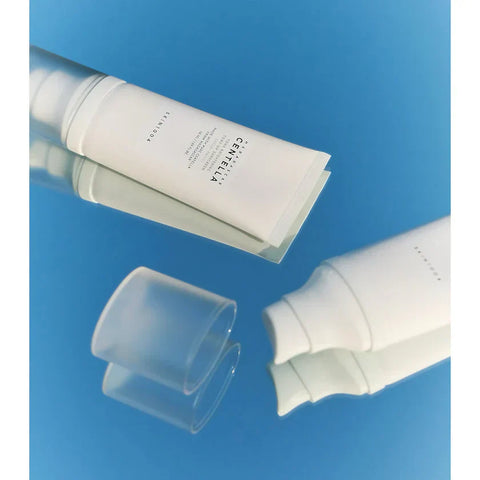Vitamin C is one of the star ingredients in skincare, and if your goal is to add just one active ingredient to your skincare routine, vitamin C is a strong recommendation! It has numerous benefits for the overall well-being of the skin, and in this article, we present them in more detail. Vitamin C is one of the most researched cosmetic ingredients and has earned its place among the royal ingredients of skincare 👑
Benefits of Vitamin C in Skincare Briefly
Boosts collagen production and prevents signs of skin aging
Fades pigmentation changes, dark spots, and acne scars
Reduces impurities and inflammation
Promotes skin healing
Acts as an effective antioxidant against free radicals
Enhances the effect of sunscreen products

Who is Vitamin C Suitable For?
Vitamin C is suitable for everyone as part of their skincare routine! Vitamin C is a natural part of our skin; it is present in the outer layer of our skin, the epidermis, at 6-64 mg/100 g. Studies have shown that daily use of vitamin C as part of a skincare routine for at least three months reduces fine lines and deep wrinkles on the face and neck area and improves skin texture and appearance.
Note! Vitamin C is a potent active ingredient, so we do not recommend it for young skin - our general recommendation is to introduce active ingredients into skincare only in adulthood and at the earliest at 18 years old.
A youthful skin appearance partly comes from even skin tone, for which vitamin C is an excellent aid, as it prevents pigmentation changes by fighting free radicals and also fades existing pigmentation changes such as liver spots and acne scars. Vitamin C can also provide relief for acne-prone skin; its anti-inflammatory properties help balance sebum production and reduce inflammation 🌱
For Beginners
Vitamin C derivatives are an easy way to get to know vitamin C, try [Beauty of Joseon] Light On Serum : Centella + Vita C, which contains a stable form of vitamin C
For Aging Skin
For strong effect, try [Medicube] AGE-R Vita C Pro Ampoule, which contains 25% pure vitamin C
For Skin with Impurities
Try a product that also contains other ingredients that control sebum production, such as salicylic acid, azelaic acid, or niacinamide. [Ariul] Expert Azelaic Acid 5% Ampoule helps control the appearance of impurities and promotes the skin's renewal process

Vitamin C: How and When to Use?
Vitamin C can be used morning and evening, but it is especially beneficial in the morning routine because it protects the skin from external stress and boosts the effectiveness of sunscreen 🌞
If you do not use other active ingredients, you can start using vitamin C twice a day. If your skin is sensitive, start once a day or choose a mild derivative form.
Vitamin C is found in almost all categories of skincare products, such as face creams, serums, cleansers, and sunscreens. However, the best effect of vitamin C is seen in serums and ampoules, where it is often easier to get a sufficiently high amount of vitamin C.
What to Pay Attention To?
Packaging: Choose an airtight and light-protected bottle. Contrary to common belief, a dropper bottle is very airtight - as long as you remember to close it!
Color: If the product turns dark yellow or brown, it has likely oxidized. Slight yellowing is a sign that the product has slightly oxidized but has not yet lost its full effectiveness.
Usage Time: Most vitamin C products should be used quickly, within about 1-3 months after opening.

Which Form of Vitamin C to Choose?
Not all vitamin C products are the same. Generally, vitamin C in cosmetics appears in two forms: pure vitamin C, which corresponds to the vitamin C found in our skin, and its various derivatives.
1. Pure Vitamin C (L-ascorbic acid)
The most effective and best-studied form, found in Yeppo's selection among others in [Cosrx] The Vitamin C 23 Serum -serum, either in a high concentration of 23% or in a more beginner-friendly 13% concentration.
A strong antioxidant and ability to stimulate collagen – the best results against signs of aging have been studied specifically with ascorbic acid.
The downside is instability (oxidizes easily) and possible skin irritation at high concentrations (>15%)
when it is unstabilized and exposed to sunlight it oxidizes and turns yellowish to dehydroascorbic acid (Dehydro Ascorbic Acid, DHAA)
Much research and work have been done to stabilize vitamin C. Vitamin C is almost always combined with other ingredients that stabilize it. One of the most well-known and used methods is to combine it with vitamin E (tocopherol) and ferulic acid. These three work in a wonderful synergy, boosting and stabilizing the product. This technology has been used in Anua Green Lemon Vita C Blemish serum. Another option is encapsulation. Sometimes the more sensitive ingredients of a product can be encapsulated, protecting the sensitive ingredient inside another substance or mixture. Encapsulation can also help sensitive skin because it often reduces skin irritation.
INCI tip: It can be difficult to tell from the ingredient list whether encapsulation has been used. One ingredient name found in ingredient lists is cyclodextrin, which is used in ingredient encapsulation. Sometimes terms like liposome and phospholipid also appear.
Ascorbic acid is an effective aid at high concentrations (15% or more) for stubborn skincare problems such as hyperpigmentation. Benefits from vitamin C are proven even at low concentrations; already at 0.6% concentration, it has antioxidant, skin-repairing, smoothing, and anti-aging effects on the skin.
2. Derivatives
More stable and skin-friendly, but not as effective as ascorbic acid. Due to their stability, they are often present in smaller concentrations in products and are often combined with other forms of vitamin C.
- 3-O-Ethyl Ascorbic Acid: effective, stable, and well tolerated. This popular form of vitamin C is found among others in [SKIN1004] Centella Tone Brightening Capsule Ampoule -ampoules
- Magnesium Ascorbyl Phosphate (MAP): mild, good for sensitive skin.
- Sodium Ascorbyl Phosphate (SAP): good for blemished skin, anti-inflammatory effect. Found, for example, in [Axis-Y] Dark Spot Correcting Glow toner
- Tetrahexyldecyl Ascorbate: corresponds well to ascorbic acid but is fat-soluble and absorbed deeply into the skin.
- Ascorbyl palmitate:fat-soluble, works well at higher pH, good in combination with other antioxidant
- Ascorbyl Glucoside: water-soluble, absorbs well into the skin

Does Vitamin C Have Side Effects and Which Active Ingredients Can It Be Combined With?
Vitamin C is a well-tolerated active ingredient in skincare. For some, it may cause a tingling or dryness sensation, which can be compensated with a soothing moisturizer. If vitamin C is too strong an ingredient for your skincare routine, you can try one of its derivatives or other antioxidants such as alpha arbutin, niacinamide, or azelaic acid.
Most active ingredients are excellent to use with vitamin C, including retinol (contrary to common misconception). There is varying information about compatibility with copper peptides (INCI: Copper Tripeptide-1), so if you want to be safe, keep these ingredients in different skincare routines.
You can also combine acids with vitamin C, such as AHA, BHA, and PHA, but consider your skin's sensitivity and test cautiously at first to see if your skin tolerates their combination 🙏🏼
Ingredients Compatible with Vitamin C:
- niacinamide
- Together with niacinamide, vitamin C effectively helps to brighten the skin tone as both work in different ways to even out skin color.
- Vitamin E
- One of the safest and most effective combinations to minimize the harmful effects of the sun's rays is vitamins C and E together.
- hyaluronic acid
- Enhance each other's moisturizing effect.
- retinoids
- The combination of antioxidants and vitamin-rich products creates better conditions for retinol and prolongs its effect –> however, use these ingredients in different skincare routines to avoid skin irritation. Use vitamin C in the morning and retinoids in the evening
- peptides (except copper peptide)
- ferulic acid
Vitamin C is effective, and numerous studies have shown it to be an unbeatable ingredient in skincare! However, it's important to use it carefully - choose a product suitable for your skin type and needs, check the packaging, and combine it correctly with other ingredients. This way, you get the best possible benefit out of this cult ingredient 🍋
updated 7/21, 2025
Pullar, J. M., Carr, A. C., & Vissers, M. C. M. (2017). The roles of vitamin C in skin health. Nutrients, 9(8), 866. https://doi.org/10.3390/nu9080866
Pinnell, S. R., Yang, H., Omar, M., Riviere, N. M., DeBuys, H. V., Walker, L. C., Wang, Y., & Levine, M. (2001). Topical L-ascorbic acid: percutaneous absorption studies. Dermatologic Surgery, 27(2), 137–142. https://doi.org/10.1046/j.1524-4725.2001.00191.x
Lin, F. H., Lin, J. Y., Gupta, R. D., Tournas, J. A., Burch, J. A., Selim, M. A., Monteiro-Riviere, N. A., Grichnik, J. M., Zielinski, J., & Pinnell, S. R. (2005). Ferulic acid stabilizes a solution of vitamins C and E and doubles its photoprotection of skin. Journal of Investigative Dermatology, 125(4), 826–832. https://doi.org/10.1111/j.0022-202X.2005.23768.x
Isoir-Ingrez, M., Falip, A., Yousfi, N., Arnaud-Sebillotte, L., Biatry, B., Leroy, F., Wang, P. H., & Simonnet, J.-T. (2025). Mastering the formulation of an unstable vitamin C (VC) as anti-aging skin care ingredient. Part I: A new approach. International Journal of Cosmetic Science. Advance online publication. https://doi.org/10.1111/ics.13050
Paula's Choice (2025). Skin Care Ingredient Dictionary. https://www.paulaschoice.com/ingredient-dictionary



 info@yepposoonsoo.se
info@yepposoonsoo.se
 14 dagar returrätt
14 dagar returrätt
 PCI-DSS Compliant
PCI-DSS Compliant
 PayPal Buyer Protection
PayPal Buyer Protection
 Klarna – Pay Securely
Klarna – Pay Securely